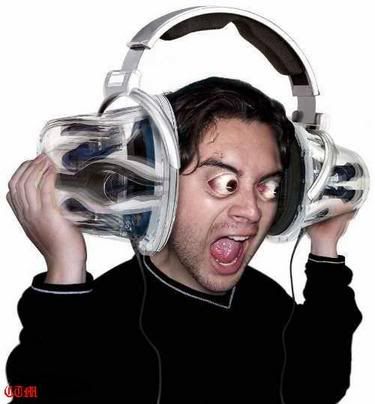Having to endure a train journey sitting next to someone who decided that he no longer wanted to retaining his hearing I felt it right to re-print this article from the London Evening Standard about i-pods and deafness.
'iPods can make you deaf'
By Mark Prigg, Evening Standard 11 May 2005
A health alert over the dangers to your hearing from portable music players is issued today.Experts say the huge popularity of iPods and other players could leave a generation of music fans with serious problems.
London commuters face the greatest risk as they play the machines at potentially damaging volume levels because of the background noise on Tubes and trains.
A leading expert warned that people had to use the players more responsibly. Andrew Reid, head of audiology at the Royal United Hospital in Bristol, said: "This is a big problem for young people, and there is a real risk that prolonged listening could lead to permanent hearing damage."
Mr Reid added: "If you are on a Tube, you have to turn the player up to dangerous levels just to hear it. Over time, this is going to lead to problems like tinnitus and severe damage to the inner ear." Tinnitus and noise-induced hearing loss occurs when the delicate hair nerve cells that line the inner ear suffer repeated trauma from loud sound vibrations.
According to Mr Reid, the first signs are a ringing or buzzing in the ears. "People really need to turn down the player straight away and consult their doctor if the problems continue," he warned.
Experts say the problem has reached critical levels due to the popularity of the iPod. Apple has sold 5.6million worldwide since it was introduced in 2001, along with over 250 million songs via its online music store.
Experts believe that usage has increased dramatically because owners can now carry their entire CD collection with them, and the latest players give up to 30 hours' playback on a single battery charge.
Recent research found that 39 per cent of 18 to 24-year-olds listen to personal stereos for more than an hour each day, with 13 per cent listening for two hours or more.
The Royal National Institute for the Deaf said: "We are concerned that many people are turning up the volume on their personal stereos to levels that could create hearing loss in the long term."
The RNID has launched a new website, dontlosethemusic.com, to warn users about the problem. It says users who are worried should investigate buying in-ear headphones that can block out background noise, allowing the volume of players to be turned down.
Experts today called for Apple and other manufacturers to limit the volume of their players, and for users to limit their listening to under an hour a day.
According to one expert, reducing the time people listen to their player is key.
"It would obviously be beneficial to reduce the volume and restrict the usage of personal players," said Christine DePlacido of the Victoria Hospital in Kirkcaldy.
She added: "The difficulty is in persuading people to do this before their hearing is damaged, as many believe hearing loss will not happen to them until they are much older. A lot of the young people I see with tinnitus describe listening to music at high intensities."
Apple said all iPods sold in Britain complied with EU volume standards, but refused to comment on the new research.




No comments:
Post a Comment